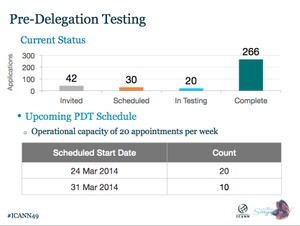Pre-Delegation Testing: Difference between revisions
Appearance
No edit summary |
No edit summary |
||
| Line 19: | Line 19: | ||
More information on PDT test elements can be found on ICANN's [http://newgtlds.icann.org/en/applicants/pdt Pre-Delegation Testing Page] and in the [http://newgtlds.icann.org/en/applicants/agb Applicant's Guidebook, Module 5]. | More information on PDT test elements can be found on ICANN's [http://newgtlds.icann.org/en/applicants/pdt Pre-Delegation Testing Page] and in the [http://newgtlds.icann.org/en/applicants/agb Applicant's Guidebook, Module 5]. | ||
=References= | |||
{{reflist}} | {{reflist}} | ||
Revision as of 18:38, 11 December 2013
Overview[edit | edit source]
The Pre-Delegation Testing (PDT) process allows ICANN to determine if registries meet specific “technical and operational requirements”[1] deemed necessary to maintain a new gTLD. PDT includes testing registry system operations and DNS server operational infrastructure. [2] Resources, from self-testing tools to PDT FAQs can be found on ICANN's Pre-Delegation Testing Page.
Important Points[edit | edit source]

ICANN identified key elements in PDT as:
- Agreeing upon a test appointment date with ICANN through the Customer Service Portal
- Beginning data entry after receiving notification and completing all entries before the test appointment
- PDT service providers conduct the testing.
- Registries are given their test results through the Customer Service Portal. [4]
Test Elements[edit | edit source]
- DNS
- EEP support
- Whois support
- IDN support
- Data Escrow deposit
- Documentation & Self-certification
More information on PDT test elements can be found on ICANN's Pre-Delegation Testing Page and in the Applicant's Guidebook, Module 5.
References[edit | edit source]
- ↑ Milestone: First of the Contracted Registries Pass Pre-Delegation Testing
- ↑ http://newgtlds.icann.org/en/applicants/agb Applicant Guidebook PDF
- ↑ http://buenosaires48.icann.org/en/schedule/mon-new-gtld PDF New gTLD Program Update from ICANN 48 Buenos Aires Presentation
- ↑ http://newgtlds.icann.org/en/applicants/pdt PDT FAQ v.2.2
